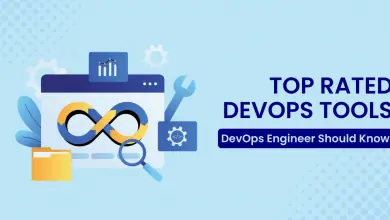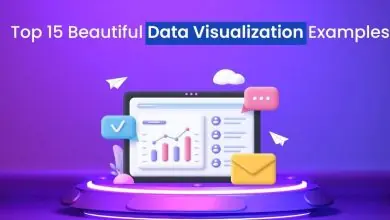Healthcare Data Analytics: Definition, Types, and Importance
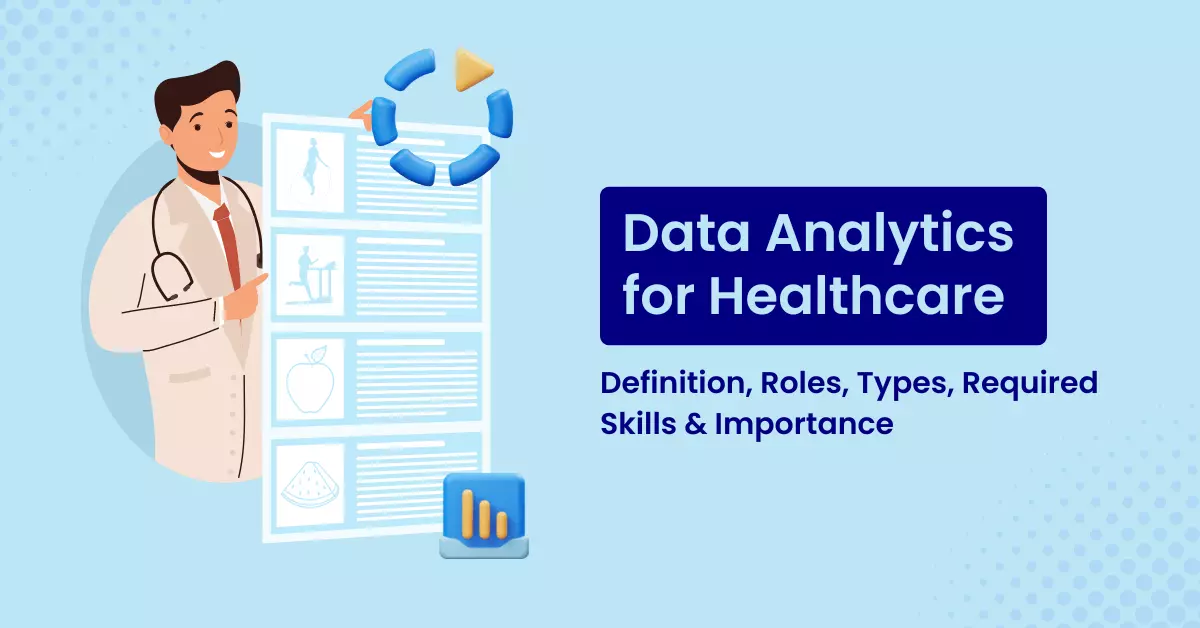
The healthcare industry is one of the most data-driven industries in the world. Doctors and researchers rely on data to make informed decisions about the best treatment options for their patients.
Data analytics has been used in other industries for years, but only recently has it started to be applied in healthcare settings. The goal of healthcare data analytics is to help clinicians make better decisions about patients based on their patient history, lab test results, and other relevant factors.
What is Healthcare Analytics?
Healthcare analytics is a broad term, but it generally refers to the process of collecting and analyzing data in healthcare. This can be used by healthcare providers, payers, and patients.
The purpose of healthcare analytics is to improve the quality of care patients receive and help them manage their health more effectively. This is done through a better understanding of how certain treatments work or which medications are most effective for certain conditions.

Healthcare Data Analytics Statistics
Healthcare analytics has become a vital part of the healthcare industry. It can help hospitals and health systems improve quality and safety, reduce costs and increase revenue. Here are some statistics that show how important it is for hospitals to use healthcare data analytics:
1. 75% of executives surveyed at hospitals say that their organization has a formal program or strategy for data and analytics.
4. 38% of hospital executives said that they see opportunities for improvement in their data and analytics capabilities.
5. 36% of respondents said their organization has already implemented a predictive model into its operations – with another 41% planning on doing so within the next year.
6. A whopping 80% of all healthcare organizations have implemented analytics programs or invested in them in some way.
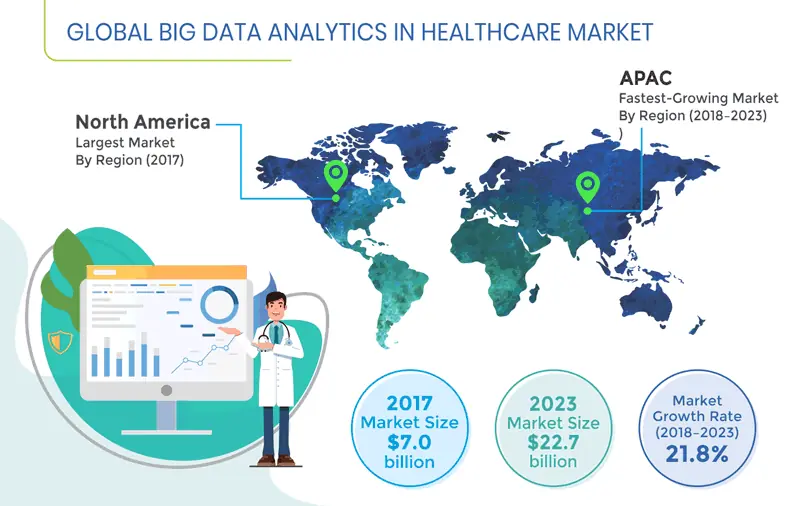
Role of Data Analytics in Healthcare
The use of data analytics in healthcare has grown over the years as more information about patients is being collected and analyzed. This data can be used to determine how patients respond to certain treatments and medications, which allows doctors and nurses to provide better care.
For example, if a doctor knows that only 20% of his or her patients with diabetes are taking their insulin properly, he or she might want to look into why this is happening.
By analyzing the data on these patients’ insulin levels before and after their visits with him/, he/she may discover that there is a problem with how they communicate with their patients.
This type of analysis could then lead them down a path towards improving communication between themselves and their patients (and ultimately improving outcomes).
Healthcare Data analytics is used to,
- Help patients get better at managing their health by giving them easy access to information about their treatment plans and outcomes.
- Provide better insights into which treatments work best for particular conditions and which may be ineffective or harmful.
- Develop new ways of delivering care that is efficient, affordable, and effective for patients with different needs and preferences.
Key Benefits of Healthcare Data Analytics
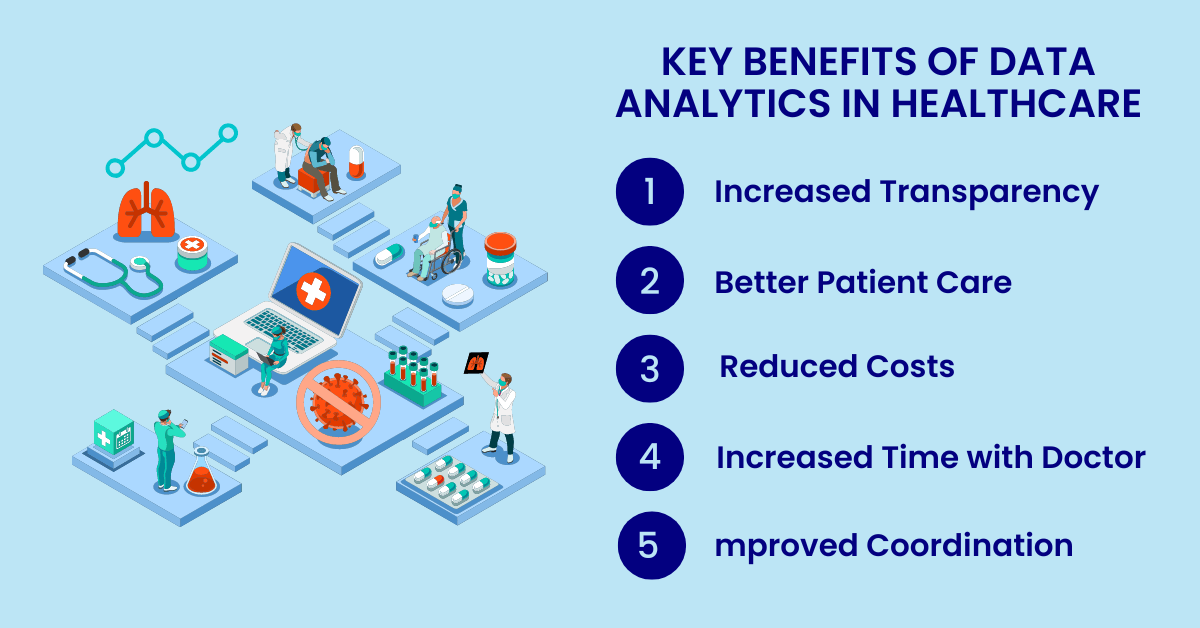
1. Increased Transparency
The healthcare industry is quickly becoming one of the most data-driven industries in the world. Data analytics is a process that allows us to extract information from existing data and use it to improve patient care and overall efficiency. As you can see, there are many benefits of using data analytics in healthcare.
For example, it can help providers improve coordination between providers by providing them with instant access to all medical records or financial details at any time; it can also help reduce costs by allowing providers to identify savings opportunities or fraudulent activity within the system.
2. Better Patient Care
One of the biggest benefits of healthcare data analytics is that it makes it easier for doctors to provide better care for patients. The more information doctors have, the better they can understand a patient’s health history and make informed decisions about treatment. This can help prevent medical errors and save lives.
3. Reduced Costs
Reduced costs are another key benefit of adopting data analytics in healthcare. By using data to improve efficiency, you can reduce waste and optimize processes. This will result in cost savings. Cost savings can also be achieved by improving patient outcomes and operational efficiency. Finally, reduced costs may come from improved revenue cycle management.
4. Increased Time with the Doctor
Data analytics can help patients and doctors better understand what’s happening with the patient, which allows them to make more informed decisions.
For example:
- A doctor who uses data analytics tools like an EMR (electronic medical record) may see a trend in patient visits or test results that might not be obvious to the human eye. They can then use this information to help inform their treatment plan or lifestyle advice for their patients.
- Data analytics could tell you that if you have high cholesterol, then consuming too much-saturated fat will increase your risk of heart disease by 15%.
- Data analysis can also give insight into what is making you sicker but it won’t tell you how to fix it!
5. Improved Coordination Between Providers and Departments
Data analytics can help coordinate care between departments. For example, a provider at one hospital may need to consult with a specialist at another hospital. Data analytics can help find the most appropriate providers in that scenario, based on their expertise and experience.
When you have a patient with multiple conditions, all their needs must be taken care of at once by the most qualified team of doctors possible—and data analytics can be used to identify these potential solutions before they arise in real-time.
Types of Data Analytics in Healthcare
Healthcare analytics is a broad umbrella term, and it can get confusing to know which type of healthcare analytics you’re looking at. Here’s a breakdown of the common types of healthcare analytics, so you know what to expect,

1. Clinical Analytics
This type of healthcare analytics focuses on patients and their current medical conditions. It usually involves data from electronic health records (EHR), and it is used to predict which patients are most likely to develop certain conditions.
2. Financial Analytics
This type of healthcare analytics focuses on the financial impact that different treatments have on patients’ overall health. It includes things like how much surgery will cost and whether it will be covered by insurance companies or Medicare/Medicaid programs.
3. Clinical Outcomes Research
This type of healthcare analytics focuses on outcomes such as mortality rates, readmission rates, re-admissions after hospital stays, etc. It’s often used to determine what areas need improvement in treatment protocols or procedures so that patient outcomes can be improved across the board.
Required Skills for Data Analysts in Healthcare
1. Able to Work Smart
Data Analysts in Healthcare must be able to work in a fast-paced environment, where data is constantly changing and evolving. They must be able to identify, process, and interpret trends from large amounts of data.
2. Think Critically
Data Analysts in Healthcare must also be able to think critically about the information they are working with, as well as other available information, and use this insight to make decisions that will benefit their company or organization.
3. Communicate Clearly
The ability to communicate clearly and concisely with others is essential for Data Analysts in Healthcare; they should be able to communicate their findings in a way that can be understood by any variety of audiences.
4. Possess a Collaborative Approach
This may require regular collaboration with other teams within an organization, including doctors and nurses who are using the data provided by Data Analysts in Healthcare to make decisions about patient care.

Final Thoughts
Data analytics services have the potential to revolutionize the healthcare industry. With more than half of the U.S. population covered by some form of insurance, providers need to be able to keep up with demand while also keeping costs down. The benefits data analytics brings are numerous and will only continue to grow over time as new apps become available.
FAQs on Healthcare Data Analytics
Healthcare data is the information that is collected and stored in a healthcare database. This data can come from many sources, including health insurance claims and medical records. This data can be used to help doctors make diagnoses and understand treatment options for their patients.
Healthcare data analytics refers to a broad range of processes used by medical professionals to analyze large amounts of patient data to improve their clinical decisions and patient care.
This includes everything from analyzing electronic medical records (EMRs) to tracking hospital readmission rates or looking at how many patients have been diagnosed with certain conditions over time.
Healthcare Data Analytics can help you better understand how your patients are experiencing your care, how long they stay in the hospital, and what treatments are most effective for them. It can also help you make more informed decisions about how to improve the quality of care or reduce costs.
The process starts with data collection. This may be done via electronic health records, laboratory results, or surveys. The next step is to clean and structure the data so that it can be analyzed effectively.
After this comes the third step: analyzing the data and creating predictive models from it. Finally, there is a final step: testing these models against actual results from real patients to see how accurate they are.
One example is using machine learning algorithms (like K-means) to predict which patients will become diabetic based on their blood sugar levels over time.
Another example would be using pattern recognition techniques (like K-means clustering) to identify similar patient populations based on their symptoms, demographics, and treatment history—and then comparing these groups against each other to find any differences between them.
Everyone benefits from healthcare data analytics, but the biggest beneficiaries are patients, who get better care, and providers who can treat more patients in a shorter amount of time.
Healthcare data analytics is all about collecting and analyzing data to make better decisions. You can start by identifying what kind of data you want to collect, and who will be responsible for collecting it. Then, you can decide how you’ll store and protect it, as well as how long you’ll keep it. If you are having queries, we can help with your Data. Drop us an email.


